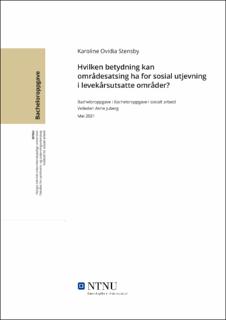Hvilken betydning kan områdesatsing ha for sosial utjevning i levekårsutsatte områder?
Bachelor thesis
Permanent lenke
https://hdl.handle.net/11250/2785820Utgivelsesdato
2021Metadata
Vis full innførselSamlinger
- Institutt for sosialt arbeid [1393]
Sammendrag
I de store byene i Norge har flyttemønstre, boligmarked, mangelfull integrering, økende sosiale forskjeller og sosial reproduksjon over tid ført til geografisk konsentrering av levekårsutfordringer i enkelte bydeler. Disse områdene er preget av akkumulerte sosiale problemer og sammensatte hjelpebehov. Faktorer som lav oppslutning om lokale sosiale arenaer, utilfredsstillende offentlige tjenester, og mangelfull sosial og offentlig infrastruktur har ført til lite samhold og tillit i lokalbefolkningen (Brattbakk, Ødegård & Aarland, 2021). Områdesatsning er et politisk virkemiddel hvor ressurser prioriteres til et utsatt byområde over en tidsbestemt periode for å bedre levekårene gjennom en rekke ulike tiltak. Prosjektenes målsetning er forankret i politiske målsetninger om like vilkår og muligheter for barn uavhengig av bosted (NOU 2020: 16). I oppgaven brukes Frasers rettferdighetsteori og Putnam, Coleman og Bourdieus teorier om sosial kapital som utgangpunkt for å drøfte hvorvidt områdesatsing kan ha en utjevnende effekt på sosiale forskjeller når det gjelder muligheter, utdanning og sosial kapital. Kan områdesatsing ventes å bidra til utjevning av levevilkår for lokalbefolkningen? Er områdesatsing en mulig løsning på geografisk sentrert fattigdom? Oppgaven oppsummerer med at planverk og målsetninger for nåværende prosjekter gir liten sannsynlighet for at tiltakene vil kunne ha slike effekter. Det generelle inntrykket er at områdesatsingene skal hindre videre negativ utvikling, og andre instanser (primært velferdsstat gjennom velferdstjenester) har ansvar for eventuelle underliggende problem som forårsaker situasjonen. I likhet med Andersen & Brattbakk (2020) etterlyses også her et bredere kunnskapsgrunnlag produsert av objektive aktører hvor effektene vurderes og evalueres, fremfor generell beskrivelse av planverk og gjennomføring.Oppgaven er skrevet på teoretisk grunnlag med utgangpunkt i fagbøker og vitenskapsartikler fra systematisk litteratursøk i relevante databaser, samt rapporter, evalueringer og handlingsplaner produsert av eller på vegne av regjeringen og departementene. In the large cities in Norway migration patterns, the housing market, inadequate integration, increasing social differences and social reproduction have over time led to a geographical concentration of challenges concerning living conditions in local areas. These areas are characterized by accumulated social challenges and complex needs of support. Conditions regarding low participation in social arenas in the local community, unsatisfactory public services, and inadequate social and public infrastructure have led to a lack of unity and trust in the local population (Brattbakk, Ødegård & Aarland, 2021).Area-based initiatives are political programs where resources are concentrated towards a vulnerable geographical area over a fixed period of time in order to improve living conditions through different measures. The desired outcome of the projects are rooted in political objectives of equal conditions and opportunities for children regardless of place of residence (NOU 2020: 16).The thesis uses Fraser's theory of justice and Putnam, Coleman and Bourdieu's theories of social capital to discuss whether area-based initiatives can have a leveling effect on social differences in terms of opportunities, education and social capital. Can area-based improvements lead to increased equality in living conditions for the local population? Are area-based initiatives suitable for influencing underlying structural conditions? The thesis summarizes that the planning and specific objectives for current projects give little probability of such effects. The general impression is that area-based initiatives are primarily aimed to prevent further social degradation, and other agencies (primarily the government through welfare services) are responsible for any underlying problems that cause the situation. In accordance with Andersen & Brattbakk (2020), this thesis also address the need of a broader knowledge base produced by objective actors where effects are assessed and evaluated, rather than giving general descriptions of planning and implementation.This is a theoretical thesis based on textbooks and scientific articles accessed through systematic literature searches in relevant databases, as well as reports, evaluations and public plans produced by or on behalf of the government and its ministries.
